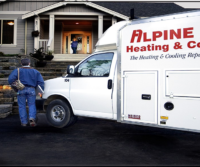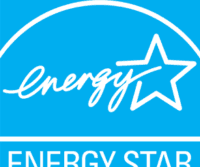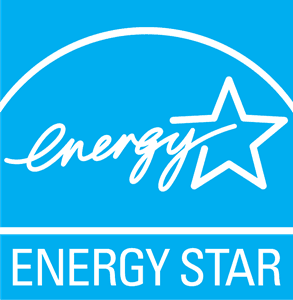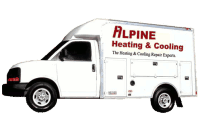
Nothing is more frustrating than when your HVAC system stops working when you need it most, causing you to consider an emergency air conditioning and furnace repair or replacement. Not only is it stressful for you and your family to be without air conditioning or heat, but it can also be a financial strain. There are a few things you can do, however, before calling Alpine Heating & Cooling.
Emergency Air Conditioning and Furnace Repair Checklist
1: Check your furnace’s air filter – if you have not replaced or cleaned it in a while, you may want to purchase a new one, since a dirty filter can restrict airflow through your home.
2: Check your circuit breakers – the breaker switch may have tripped or shut off by accident. It is important to keep in mind that a tripped HVAC breaker may indicate a more serious issue, so schedule an inspection with us immediately.
3: Make sure the vents in your home are not obstructed – Blocked or closed vents can limit the airflow through your home.
4: Check the thermostat – if your thermostat uses a battery, it could need to be changed. You can also check to see if there is dust or dirt in the thermostat by removing the faceplate. If there is dust or dirt, use a can of compressed air to gently remove it. Also, frequently changing the temperature on the thermostat can cause the compressor in your system to overheat and shut down. To avoid this, be patient once you set your desired temperature. The system could take up to five minutes for the HVAC system to turn on.
If after going through this emergency HVAC repair checklist and your unit is still not functioning properly, it may be time to call us. A malfunctioning HVAC system could drive up your energy costs along with the expensive emergency furnace and air conditioning repairs. Time is of an essence. Alpine Heating & Cooling will travel to your home in our Skagit Valley service area to assess the HVAC system and create an estimate for the repair and complete the repair.

Maintain your HVAC equipment to prevent future problems and unwanted costs. Keep your cooling and heating system at peak performance by having Alpine Heating and Cooling do annual pre-season check-ups. We get busy once summer and winter come, so it’s best to check the cooling system in the spring and the heating system in the fall. To remember, you might plan the check-ups and spring maintenance around the time the daffodils starting blooming for the La Conner Daffodil Festival and in the fall around the Festival of Family Farms.

A Typical Spring Maintenance Check-up Should Include the Following
- Check thermostat settings to ensure the cooling and heating system keeps you comfortable when you are home and saves energy while you are away.
- Tighten all electrical connections and measure voltage and current on motors. Faulty electrical connections can cause unsafe operation of your system and reduce the life of major components.
- Lubricate all moving parts. Parts that lack lubrication cause friction in motors and increases the amount of electricity you use.
- Check and inspect the condensate drain in your central air conditioner, furnace and/or heat pump (when in cooling mode). A plugged drain can cause water damage in the house and affect indoor humidity levels.
- Check controls of the system to ensure proper and safe operation. Check the starting cycle of the equipment to assure the system starts, operates, and shuts off properly.
Cooling Specific
- Clean evaporator and condenser air conditioning coils. Dirty coils reduce the system’s ability to cool your home and cause the system to run longer, increasing energy costs and reducing the life of the equipment.
- Check your central air conditioner’s refrigerant level and adjust if necessary. Too much or too little refrigerant will make your system less efficient increasing energy costs and reducing the life of the equipment.
- Clean and adjust blower components to provide proper system airflow for greater comfort levels. Airflow problems can reduce your system’s efficiency by up to 15 percent.
Heating Specific
- Check all gas (or oil) connections, gas pressure, burner combustion and heat ex-changer. Improperly operating gas (or oil) connections are a fire hazard and can contribute to health problems. A dirty burner or cracked heat ex-changer causes improper burner operation. Either can cause the equipment to operate less safely and efficiently.
Actions To Do Yourself
- Inspect, clean, or change air filters once a month in your central air conditioner, furnace, and/or heat pump. Your contractor can show you how to do this. A dirty filter can increase energy costs and damage your equipment, leading to early failure.
With all of the severe watches and warnings this winter in Skagit County, you may need help fast with your HVAC system! The freezing temperatures are expected to stick around. Skagit County has seen 2-6 inches of snowfall overnight Sunday and the snow will not be melting for several days. If you are having issues with your heating system, we can provide fast service.
Are you a new home owner in Anacortes, Burlington, Mount Vernon, La Conner or surrounding areas in Skagit county? If so, you understand how much those utility bills can impact your budget. The average household spends more than $2,200 a year on energy bills, with nearly half of this going to heating and cooling costs. It’s important to make smart decisions about your home’s heating, ventilating, and air conditioning (HVAC) system that can help save on energy costs, improve your overall comfort at home, and help fight global warming.
 Did you know the energy used in the average house is responsible for twice as many greenhouse gas emissions as the average car? When power plants burn fossil fuels to make electricity,they release greenhouse gases. By using less energy at home, you help reduce the emissions that contribute to global warming. ENERGY STAR is the government-backed program that helps us all save money and protect our environment with energy-efficient products and practices. Whether you are looking for recommendations about energy-efficient equipment, getting a quality installation, HVAC maintenance, or ways to make your heating and cooling system operate more efficiently, EPA’s ENERGY STAR program can help!
Did you know the energy used in the average house is responsible for twice as many greenhouse gas emissions as the average car? When power plants burn fossil fuels to make electricity,they release greenhouse gases. By using less energy at home, you help reduce the emissions that contribute to global warming. ENERGY STAR is the government-backed program that helps us all save money and protect our environment with energy-efficient products and practices. Whether you are looking for recommendations about energy-efficient equipment, getting a quality installation, HVAC maintenance, or ways to make your heating and cooling system operate more efficiently, EPA’s ENERGY STAR program can help!
Consider giving Alpine Heating and Cooling a call if any of these statements apply to you:
- Some of your rooms are too hot or cold.
- Your home has humidity problems, excessive dust, or rooms that never seem to get comfortable.
- Your equipment needs frequent repairs and your energy bills are going up.
- Your heating and cooling equipment is more than 10 years old.
- You leave your thermostat set at one constant temperature.
- You used EPA’s Energy Star Home Energy Yardstick to compare your household’s energy use to others acress the country and your score is below five.

1. Study up — Find out about license and insurance requirements for contractors in your state. And before you call a contractor, know the model of your current system and its maintenance history. Also make note of any uncomfortable rooms. This will help potential contractors better understand your heating needs.
Tip: Alpine Heating and Cooling License and Insurance Information
2. Ask for referrals — Ask friends, neighbors, and co-workers for contractor referrals. You can also contact local trade organizations for names of members in your area.
Tip: Alpine Heating and Cooling is a proud member of the Burlington Chamber of Commerce
3. Call references — Ask contractors for customer references and call them. Ask about the contractor’s installation or service performance, and if the job was completed on time and within budget.
Tip: Check out Alpine Heating and Cooling reviews.
4. Find special offers — A heating and cooling system is one of the largest purchases you’ll make as a homeowner. Keep your costs down by checking around for available rebates on energy-efficient ENERGY STAR qualified heating and cooling equipment.
Tip: Check out Rebates for Washington State Homeowners
5. Look for ENERGY STAR — ENERGY STAR qualified products meet strict energy efficiency guidelines set by the U.S. Environmental Protection Agency and offer significant long-term energy savings. Alpine Heating and Cooling can show you calculations of savings for ENERGY STAR heating and cooling equipment.
6. Expect a home evaluation — Alpine Heating and Cooling will spend significant time inspecting your current system and home to assess your needs. A bigger system isn’t always better; Alpine will size the heating and cooling system based on the size of your house, level of insulation, and windows. Alpine Heating and Cooling will inspect your duct system (if applicable) for air leaks and insulation and measure airflow to make sure it meets manufacturers specifications.
7. Get written, itemized estimates — When comparing contractors’ proposals (bids), be sure to compare cost, energy efficiency and warranties. A lowest price may not be the best deal if it’s not the most efficient because your energy costs will be higher.
8. Get it in ink — Sign a written proposal with a contractor before work gets started. It’ll protect you by specifying project costs, model numbers, job schedule and warranty information.
9. Pass it on — Tell friends and family about ENERGY STAR. Almost one-quarter of households knowingly purchased at least one qualified product last year, and 71% of those consumers say they would recommend ENERGY STAR to a friend. Spread the word, and we can all make a big difference.
10. Get the ENERGY STAR Guide.
Tip: Click here for the Guide to Energy Efficient Cooling and Heating

 As much as half of the energy used in your home goes to heating and cooling. So making smart decisions about your home’s heating, ventilating, and air conditioning (HVAC) system can have a big effect on your utility bills — and your comfort. Take these steps to increase the efficiency of your heating and cooling system.
As much as half of the energy used in your home goes to heating and cooling. So making smart decisions about your home’s heating, ventilating, and air conditioning (HVAC) system can have a big effect on your utility bills — and your comfort. Take these steps to increase the efficiency of your heating and cooling system.
Change your air filter regularly
Check your filter every month, especially during heavy use months (winter and summer). If the filter looks dirty after a month, change it. At a minimum, change the filter every 3 months. A dirty filter will slow down air flow and make the system work harder to keep you warm or cool — wasting energy. A clean filter will also prevent dust and dirt from building up in the system — leading to expensive maintenance and/or early system failure.
Tune up your HVAC equipment yearly
Just as a tune-up for your car can improve your gas mileage, a yearly tune-up of your heating and cooling system can improve efficiency and comfort.
Install a programmable thermostat
A programmable thermostat is ideal for people who are away from home during set periods of time throughout the week. Through proper use of pre-programmed settings, a programmable thermostat can save you about $180 every year in energy costs.
Seal your heating and cooling ducts
Ducts that move air to-and-from a forced air furnace, central air conditioner, or heat pump are often big energy wasters. Sealing and insulating ducts can improve the efficiency of your heating and cooling system by as much as 20 percent — and sometimes much more.
Focus first on sealing ducts that run through the attic, crawlspace, unheated basement, or garage. Use duct sealant (mastic) or metal-backed (foil) tape to seal the seams and connections of ducts. After sealing the ducts in those spaces, wrap them in insulation to keep them from getting hot in the summer or cold in the winter. Next, look to seal any other ducts that you can access in the heated or cooled part of the house.
Consider installing ENERGY STAR qualified heating and cooling equipment
If your HVAC equipment is more than 10 years old or not keeping your house comfortable, have it evaluated by a professional HVAC contractor. If it is not performing efficiently or needs upgrading, consider replacing it with a unit that has earned the ENERGY STAR. Depending on where you live, replacing your old heating and cooling equipment with ENERGY STAR qualified equipment can cut your annual energy bill by more than $115. But before you invest in a new HVAC system, make sure that you have addressed the big air leaks in your house and the duct system. Sometimes, these are the real sources of problems rather than your HVAC equipment.
Contact Alpine Heat to ask about Proper Installation of your new equipment
Replacing your old heating and cooling equipment with new, energy-efficient models is a great start. But to make sure that you get the best performance, the new equipment must be properly installed. In fact, improper installation can reduce system efficiency by up to 30 percent – costing you more on your utility bills and possibly shortening the equipment’s life.
Today, more than ever before homeowners are concerned with the overall air quality in their homes. That said here are a few simple and easy ways to keep the air in your home is clean as possible. While everyone knows that it is important to change air filters regularly, here are some other ways of keeping your home clean that sometimes go overlooked. For example, adding a humidifier or dehumidifier to your home can actually help to stop the growth of mold and mildew.
Ensure That Mold and Mildew Do Not Grow Over Time
In many cases these systems can work in tandem with a regular HVAC system. Keeping the humidity level in your home below around 55% will help to ensure that mold and mildew do not grow over time. In homes where the air quality is poor and when there is mold and mildew growth, occupants can end up having dry skin, sore throats, allergies, itchy eyes and even bloody noses. Also important to note is that fungus can grow in damp environments such as in a basement or bathroom.
These Are Natural Filtration Systems
Checking for plumbing leaks is another great way to make sure that undesirable microscopic growth is not occurring someplace in your home. Another uncommon solution for keeping the air in your home as clean as possible is to add a generous amount of houseplants throughout the interior of your house. These are natural filtration systems that do wonders for indoor air quality. They remove toxins from the air and provide much-needed oxygen. This is one of the least expensive ways to improve the overall quality of air in your home. Contact Alpine Heating & Cooling today to learn more about HVAC system maintenance and care located in Burlington, WA and serving all of Skagit County.
Summer is a wonderful time of year especially for those who enjoy the great outdoors. That said coming home to a cool and comfortable home sometimes requires a little bit of proper maintenance, care and management when it comes to a residential HVAC system. Here are a few simple ways to maximize the efficiency of your HVAC system. For example, it is best to make sure that your HVAC system is balanced. Balancing a system of this nature simply involves making adjustments with regard to what are known as volume control dampers as well as registers.
Only Requires Moving a Lever
While not all systems have these components, the ones that do would be best served by having a quick inspection and balancing performed. Registers are perhaps the easiest to deal with and only require moving a lever to make an adjustment. Registers simply control how much conditioned air is allowed to enter a particular room or space within your home. As a note, registers that are positioned the farthest from the main HVAC system should always be kept full open.
Call An Expert To Adjust Registers
Conversely, those that are located close to the central system can be adjusted to be partially closed or completely closed as necessary. While homeowners can do this on their own, it is sometimes best to call upon an expert to adjust registers. This is simply due to the fact that professional technicians will have unique and special instruments that can measure airflow and temperature more accurately. The end result is energy savings and lower utility bills.
Replace Any Items That Have Proven To Be Defective
In addition, most experts recommend establishing a preventative maintenance program for your valued HVAC system. This includes routine changing of air filters as well as inspections at least annually or bi-annually. Having the heat exchanger surfaces cleaned as well as refrigerant coils, condensers and evaporators checked will ultimately be worth it over the short and long-term. Leaks should be repaired and coils, ducts and piping as well as fitting should all be inspected regularly. Always replace any items that have proven to be defective. Contact Alpine Heating & Cooling today to learn more about HVAC system care and maintenance in the Skagit Valley including Anacortes WA, Mount Vernon, Burlington and La Conner.


